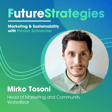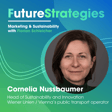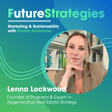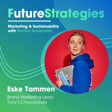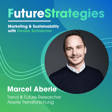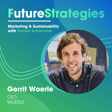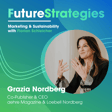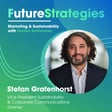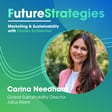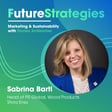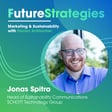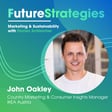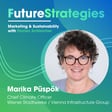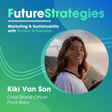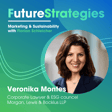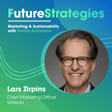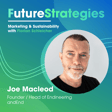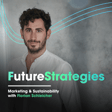Marketing Responsibility in Consumer Education
00:00:00
Speaker
I think we have growing responsibility as marketers to educate and guide consumers, and we really need to stop selling them things that they don't need. There's forces out there that are so strong that they will make us change no matter what, and we probably can't resist that change.
Introduction to the Future Strategies Podcast
00:00:17
Speaker
Welcome to Future Strategies. I'm your host, Florian Schleicher.
00:00:22
Speaker
And this show is my gift to you. In honest conversations with inspiring marketing leaders, we explore how marketing and strategies can achieve sustainable growth. If you would like to apply this to your own projects, that's exactly what I do as a strategist, coach, and workshop facilitator. I'm here to help you build the marketing of your futures. So let's jump right into it.
Guest Introduction: Alexandra Kliman
00:00:55
Speaker
Meet Alexandra Kliman, a seasoned marketeer with nearly a decade of experience in the circular economy. In her role as head of markets and brands at REFERC, she makes it easy for consumers to rethink new. Before that, she was the CMO of SPOC, another circular economy startup, where she raised aided and unaided awareness by 30%. Welcome to the show, Alexandra. I have nothing. Great to be here.
00:01:21
Speaker
So when I was head of marketing at Too Good to Go, I was always looking at what Reverb was doing because you had already such an amazing brand and it was one of the leading voices in the circular economy.
REFERC and the Circular Economy
00:01:33
Speaker
Before we dive into for our guests who don't know what Reverb is doing, can you please give us a short summary? Sure. Reverb is a marketplace for refurbished electronics, which means that we sell products that are completely professionally refurbished. Our product range
00:01:49
Speaker
goes from smartphones, laptops, tablets, to small domestic appliances, sports goods, we sell e-bikes, we are about to launch a few new exciting product categories, and all of these products function like new but are cheaper for the consumer and have a positive impact or a smaller impact on the environment because they extend their life cycle and get a second life.
00:02:10
Speaker
That sounds amazing because the electronic waste, I just saw a statistic the other week, how big
Environmental Benefits of Refurbished Electronics
00:02:17
Speaker
it is. And I know that in the US alone, only 17% are recycled, which creates mountains of discarded tech.
00:02:26
Speaker
And studies estimate that if you buy a purchased or refurbished phone, you can save up to 80% of CO2 emissions and 90% of the raw materials that are producing a new one. So it sounds like a complete no-brainer. So I would be curious, do you have any challenges in marketing at all?
Consumer Education Challenges
00:02:46
Speaker
I think there's still a challenge that we have, which probably a lot of companies in the industry have.
00:02:51
Speaker
For people, it's sometimes hard to understand what the difference between use and refurbishment is. And one of the first challenges that we set for ourselves in marketing is that we wanted to establish refurbishment as a new product category. You have new products on the one hand, then you have used products and refurbishment is neither of those two. It's an entirely new category.
00:03:11
Speaker
That's something that requires a lot of education because consumers first need to understand this new category. We do see trust barriers and we see that people still need to understand that with those products, they get a warranty. They can send them back if they don't like them. They get customer support if something doesn't work. It's a very different experience to buying
00:03:32
Speaker
a used phone on say a secondhand platform. Yeah. Compared to Spock where you were working previously, this is just like a used product, but now you're selling refurbished products.
Marketing Challenges: Used vs Refurbished
00:03:43
Speaker
Exactly. I'm seeing the two sides because at Spock the challenge was always you would get people who complained something didn't go wrong. You want to help them, but there's only so much you can do because you're not the selling party and you only have very limited access to actually getting them to return the product or get their money refunded.
00:04:00
Speaker
which is very different to the refurb situation. Yeah. And is your marketing then only focused on B2C or do you also have a B2B angle?
B2B Market for Refurbished Electronics
00:04:09
Speaker
We have B2B as well, just because we see that it's super important for companies who buy huge amount of electronics, often replace them every year, every second year. And getting these products refurbished is a huge benefit for them. It saves them money, which is the same benefit that you have as a consumer, but it also helps you to make
00:04:28
Speaker
an environmentally conscious decision for your business. And we're seeing that especially small and medium enterprises are looking for those easy tools to be more sustainable, but also some governmental institutions or in Germany, we have a lot of schools we partner with. So all of these institutions that are close to governmental institutions,
00:04:49
Speaker
They also have a very real incentive of having to be more sustainable because in one way or another, they have to report the sustainability approach. Yeah. And I think you're in a great spot at the moment because so many companies and governmental institutes have to become more sustainable and they have to analyze what's an easy way to do that because they can't change their whole way of operating, but they could change on where they buy their tech.
00:05:15
Speaker
They can, and it's also an employer benefit because I think employers appreciate if companies take sustainable choices. Yeah. Now let's go back to trust. How do you create trust in marketing?
Building Consumer Trust
00:05:28
Speaker
What are some means? What are some actions that you're doing that have worked so far? I think there's a few things that you can do. What we always focus on is that we very clearly communicate the obvious benefits that you have. So with every product that you buy at Reverb,
00:05:43
Speaker
You get at least 12 months warranty, which means you get the same warranty that you get if you purchase a new product. You also get a 30 days return period, which again, is pretty much the standard that everybody's used to when they purchase something in an e-commerce. That's the one thing. The second thing is we're trying to also highlight the process behind it. So as we said before, people sometimes don't understand the difference between used and refurbished.
00:06:07
Speaker
So explaining to them that a refurbishment process can have up to 40 steps where professional companies take apart the whole device, find the spots or find the pieces that need replacement, replace them, put together the device, make sure it's secure, make sure all data is cleaned. That's also a huge concern people always have. What happens to the data on my phone if I sell it? What happens if I buy somebody else's phone, will I all of a sudden have their old data on my phone?
00:06:34
Speaker
So we're really trying to explain the whole process to make sure people understand there is a professional data cleaning process in the background. And then the third angle to it is, I would say, reviews and everything that gives us trust signals that's not from us. Because usually, I think it's a hard challenge to have, but you can't walk around and shout, we're trustworthy, we're secure, trust us. It's just going to make you very, very incredible.
00:06:59
Speaker
Whereas if you have somebody else who sustains your trust positioning, that's obviously going to help you. So whether that's product tests that we're running with journalists or third parties, reviews, we usually highlight our trust pilot scores because they're very high. All of these elements tell people that it's safe to buy from us. And we know that people have a much lower barrier to entry if they got a recommendation for us from a friend or family. So referral is also a huge topic for us.
00:07:29
Speaker
Yeah, I can imagine. Let's go a little bit deeper on that.
Marketing to Emotional and Rational Needs
00:07:32
Speaker
I've read the other month, a book on a psychological model. Maybe you know this. It's about the emotional side that we all have in us and the rational side. And it's explained through the model of an elephant and a rider. So the rider sits perched atop the elephant and has the task of steering the elephant. And he knows, okay, I should go there. So I will steer the elephant there. That's what our brain is doing.
00:07:57
Speaker
The elephant usually follows the rider, but it is much stronger. And if the elephant doesn't want to go right, then it will go left, whatever the rider does. And I think this so very well highlights how we all work. Like I can set my alarm today to wake me up at 6 a.m. in the morning. This is my rider taking an action. And in the morning, when it's 6 a.m., my elephant wakes up and says, no, 30 more minutes.
00:08:27
Speaker
And I think this so much translates to a lot of decisions in sustainability. We all know we have to do something good and we have to shift to a more sustainable lifestyle and we also need to participate in a circular economy. But then the elephant kicks in and says, I want something new. I want this or I want that and I don't want to research. Is it really safe? How do you convey those emotions in your marketing?
00:08:56
Speaker
I didn't know the model but I love it.
00:08:59
Speaker
I think it's very visual and very clear. It's a really good question and a really big challenge. One big advantage that we have versus other companies in the sustainability space is that we have two benefits for the consumer. It's better for the environment, but it's also cheaper. And that's something that really differentiates our business model from a lot of the other sustainable business models, where usually your drive and commitment to do something sustainable
00:09:27
Speaker
has to be so big that you swallow price premium. Often what we see is that, especially for people who try this for the first time, price is one of the decisive factors. Because again, thinking of your psychological model, you see something that's 40% cheaper. It's so tempting.
00:09:44
Speaker
that maybe you overrule the trust concerns that you have and think, well, if I really can send it back within 30 days and if I really get those 12 months warranty, why shouldn't I try to get an iPhone 40% cheaper? I think that's one of the benefits that we have. The second thing that you said about emotions is obviously something that we also try to incorporate in marketing.
Effective Customer Communication
00:10:03
Speaker
I think it's really important that you speak to customers on eye level and try not to be
00:10:07
Speaker
patronizing even if you're selling or especially if you're selling a sustainable product because people don't want to hear what they should be buying or what they should be doing i think consumption in its core is always about satisfying some sort of pleasure that you have.
00:10:24
Speaker
Which means that you will always want to get something that you want and not necessarily something that you need. And I think if in your marketing you focus too much on, you should do this, you need to do that. This is better for you. Then you risk that people turn away from you because they don't want to be told what they should be doing. They just want to have an enjoyable purchasing experience and they want to have that amazing feeling when they unwrap a new product. And new in this case can also be new to them. It doesn't necessarily mean to be new in this world.
00:10:54
Speaker
Yeah. Which is also the new marketing claim that we've launched beginning of the year, which is to rethink new. And I think that summarizes quite well what we're trying to do. Yeah. I like that because for so many things, it's about this emotion that we attribute to newness. But it can be something that has already been used, but I get it now and now it's new to me. And the experience oftentimes is not different.
00:11:18
Speaker
You can still package it in a nice way or in an original packaging. Or you could give a little note to it and say, hey, thanks for buying this refurbished product. So I think that that's a very good way to play with this and to get people along to enjoy this experience. Do you also do like them unpackings? Because this is one of the things that I know from the tech industry that everybody loves how the things look when you unpack them for the first time. Is it also something that you're looking into?
00:11:47
Speaker
We're looking into it, we're trying to make it better. Also because we know that, as you said, this unpacking experience is not just a huge trend on social media, it's also what makes you feel special when you're unwrapping a new product. One of the challenges that we have is that we're a marketplace, so we're not always the ones sending or delivering the product. But it is one of the things that we're trying to do and also trying to make packaging more sustainable. Because of course, if you purchase a sustainable product,
00:12:14
Speaker
You don't want to have to unwrap layers and layers of plastic before you finally get to the core of the exciting new product that you bought. Yeah. Another thing I wanted to ask you is, there are more and more companies that start their own circular economy business. Most famous probably Patagonia with their one wear, but I've read that also Apple began offering refurbished versions of their MacBook Pro beginning of this year. What is your take on that? Is that your competition?
00:12:41
Speaker
I think generally from our perspective, every product that's not newly produced but gets a second life is something positive for the environment, something positive for our
Greenwashing vs Genuine Sustainability
00:12:51
Speaker
world of consumption. The way we see it, and that's actually part of our founding story, is that often big corporations take this step as part of a green washing strategy, to put it very drastically, but don't really pursue it with a lot of energy.
00:13:06
Speaker
One of our co-founders actually worked for, built the refurbishment industry at Amazon. And he then left Amazon to found his own company because he saw that within this whole huge corporation, refurbishment just wasn't getting the attention that he thought it should be getting because it obviously cannibalizes all of your high margin sales of new products. And I think selling refurbished laptops is definitely a great step into the right direction. It helps us educate the market because as I said in the beginning,
00:13:35
Speaker
Not everybody knows what it is. So if a giant like Apple is selling these products, then probably they are going to help us educate the market. I'm personally still skeptical if it's going to be a really big part of their business and P&L just because they make much bigger margins selling their glamorous new iPhone every year.
00:13:54
Speaker
Yeah. How do you experience, because you just dropped the word greenwashing. And from my experience, a company that is doing good per se is under much more scrutiny than the bad companies. So probably people look to you and your brand and say, okay, you're the shining star. You must do everything right. How do you then avoid falling into the trap of maybe exaggerating something and still keeping it clean of any false claims?
00:14:24
Speaker
I think it's a really good point and I think it's also fair that sustainable companies are under higher scrutiny because in the end, marketing should be transparent. If you're not selling a sustainable product and you're not talking about it, that is a way of being transparent. Whereas if you are selling a sustainable product and you're talking about it, then it's okay for people to pay a lot of attention to what you're saying is actually true. I think it's generally good this is happening.
00:14:48
Speaker
What we're trying is we just try to be on top of regulation. We try to be transparent. We have focus groups to understand how consumers perceive our communication.
Transparency and Green Claims Directives
00:14:59
Speaker
We also participate a lot in lobbying on EU side.
00:15:03
Speaker
So we're trying to accelerate things like the green claims directive that has been launched last year. We are actively trying to participate in those things because we think it's important. But obviously that means that we also need to review all of our copies. We need to review our product texts and make sure that there's nothing wrong inside, which we're doing. We have an amazing legal team that's supporting us with us. And at the same time, we're also actively working to get claims that we can make with good conscience.
00:15:30
Speaker
So we run a research project with Fraunhofer Austria Gebbeha last year, who helped us to do a complete lifecycle assessment of five of our best-selling products. And they proved the impact numbers that you already quoted in the beginning of the podcast. And by getting this research, we have the data at hand. We have all of the information that we need to do convincing marketing. And we by default know that it's not greenwashing because we had a research institute verify them for us. So I think we're trying really hard to be transparent.
00:15:59
Speaker
trying really hard to have the right numbers. And we're also trying to be ahead of the curve because we think that some of the EU initiatives, like for example, the product passport, they're just moving very, very slowly. Current perspective is that this is going to be in place not before 2026. And we think that there needs to be a transparent way to track where your product comes from and where your product goes before in two years' time. Yeah.
00:16:22
Speaker
It seems to me like you're doing a lot of research and while we're having our pre-talk, you also mentioned, okay, I have a focus group afterwards. Why is it so important for you to get this outside perspective and not just go with your gut feeling and say, I think that's the thing we should do. I think sometimes you need gut feeling. You probably know that from a lot of the people you speak to that sometimes good marketing is also based on being bold and having the right gut feeling.
00:16:53
Speaker
But generally, I think this outside confirmation just helps us go into the right direction. Because again, going back to the fact that we need to educate the market, this is a really big challenge. This is a much bigger challenge than trying to market a differentiated product, because you need to understand what do people need to understand how refurbishment works? What are the current barriers? How can you overcome the barriers? And I also mentioned before that I think you need to communicate on eye level with your consumers.
00:17:23
Speaker
And unless you frequently speak to them, that is something that's really, really hard to do. So sometimes in those focus groups, the findings are really eye-opening because something that was super obvious for you maybe wasn't understandable at all for a customer. And I think if you work for too long in your little office with your little marketing team and you don't focus on the outside, then probably the work that you produce won't really be good. And it probably also won't reach the right people with the right message.
00:17:52
Speaker
Yeah, yeah, definitely. I think it's good to be in touch and to talk to people actually talking. And I like also that you're taking a qualitative approach because quantitative, yes, it gets you somewhere, but mostly it helps you verify the thesis that you already have. But quantitative research oftentimes doesn't give you anything new. It just says, yes, you're right or no, this is different.
00:18:19
Speaker
I would be curious about something more which is more about the future. Last year, I read you raised $57 million in your Series C funding.
REFERC's Future Plans and Expansion
00:18:31
Speaker
What will you do with all this new marketing budget?
00:18:36
Speaker
First of all, we're trying not to blow it away. I think we've really had a big pivot in our company strategy where like many startups, we were on a hyper growth phase. And I think a lot of what happened over the past few years has really taught us that you need to be sustainable as a business, and I'm not talking about environmental sustainability.
00:18:57
Speaker
but being sustainable from a profitability and financial perspective. And that is something that has really changed us as a business and something that definitely won't change with the new funding. And what we want to use it on is doubling down in our existing markets, making sure more people know what refurbishment is and more people buy from us. So making our footprint larger in the markets that we're already in.
00:19:21
Speaker
We are considering some new market launches and we're definitely going to launch new categories. Also because we think that the more categories you have, the easier you make it for people to consistently return, to consistently buy from you.
00:19:34
Speaker
And overall, that's going to help people reduce their footprint because we want to make consumption as sustainable as possible. I think consumption per se can't be sustainable, but we want to make sure that we cover as broad a range as possible with products that can get a second life and products that are as good as new when you get them.
00:19:53
Speaker
I think this, as good as new, it just triggered something else in my head, which is the perception of what is new and what do I buy. Most of us don't have any problem buying a used tech gear, but if we would say, do you want to buy a used mattress? We probably would say no.
00:20:12
Speaker
Hanyly, the mattress is something that we have as a running gag internally. Yes, but the mattress I think is a super interesting example because we're all sleeping in hotel beds where God knows what has happened before we have been lying in there.
00:20:28
Speaker
So I think it's really a lot about this perception, how we perceive things. And one of my friends, she's the founder of Faircado, which is a browser plugin where you can find used items for your search, for clothing, for all tech. And they also face this problem. How do you get people to appreciate something that has already been used?
00:20:50
Speaker
And I think it can also add something. There is this study, maybe you've heard of it, that was done on eBay by some psychologists, where they bought a bunch of items at a flea market at about $100. And they sold it on eBay, but not just the item, but they invented a story about each and every item. And in the end, so they bought it for $100, they were able to sell it for $2,600.
00:21:17
Speaker
So used things can have a value also if they have something more than just a product. So I think that also shows, okay, there is huge potential in getting people on board on this.
00:21:29
Speaker
True, the power of marketing. And something we often discuss is use cars. If you want to buy your kid a car, your kids just turn 18, just pass the driver's license. I think very, very few people would think about getting them a new car because you sort of know in a few months from now, it's going to have some bumps, it's going to have some scratches, it's going to have some dents.
Building Trust Through Children's Products
00:21:49
Speaker
So you wouldn't want to spend all that money. And that's something that we also see with refurbished products that often people maybe don't consider it for themselves at first. They would maybe buy them for their kids. Their 12 year old really wants an iPhone. Do you want to spend the full amount on a new iPhone or do you save a little bit and then get them a refurbishment iPhone? And the risk of them ruining is just a tiny little bit smaller.
00:22:13
Speaker
And I think from this, from having this first purchase experience and seeing that the product is as good as new, that sometimes gets people to consider them for themselves and they then turn into returning customers who first bought for their kids, then buy for themselves and then maybe buy for their parents. Yeah. That's a great example. Yeah.
00:22:30
Speaker
But yeah, everybody does it for used cars. Yeah, nobody talks about that. And clothing, just right now, it experiences a huge boom, resale of clothing that's getting bigger every month, which is fascinating. On a more personal note, do you still remember the first used item that you bought? I remember how I first got my job at Spock. Unfortunately, it didn't end in a purchase, but I was looking for a split board.
00:22:57
Speaker
Cause I'm an avid snowboarder. I wanted to start ski touring, but I can't ski well enough to go off piste. And those split boards are snowboards that are split in half. So you can take them apart, climb up a mountain, then put it back together and snowboard down. They're really expensive, unfortunately. So since I was a beginner, I didn't want to spend all that money and I was looking for one on Spock at the time.
00:23:19
Speaker
I didn't find the split board, but I found the job that I then had. And I think after that I bought a ton of things used. I don't actually remember what the first one was. Do you still remember what the last item that was used or refurbished that you bought?
00:23:33
Speaker
I bought a refurbished Dyson for Christmas because Dyson is one of the partner brands that we launched. It's a very silly dream, but I have a lot of hair and I've always wanted to have a Dyson, but didn't want to spend that much money on a hair dryer. And then I decided to get a refurbished one. Nice. Before we switch to the final three questions, do you have any questions for me? From speaking to your partners, how do you see them handling the trust element, especially if you're
00:24:01
Speaker
A new company, maybe not everyone knows you yet. That's something that I'm really curious about. Yeah. Super interesting point. The challenge with trust, I think, is you can only build it long-term, but you can lose it very fast. So for me, trust, and you gave a great example at the very beginning, it's something that of course you can convey, but it's always better to get other people talking about you.
00:24:24
Speaker
When I was working at Too Good to Go, one big thing of what we were doing was PR. I think the last year I was at Too Good to Go, we had over a thousand press clippings. This is huge for the Austrian market. And what it does it, it shows that newspapers, media companies, they write about you and automatically you get this trust.
00:24:46
Speaker
So one thing I always say to all my clients and all projects, you're not using PR right, or you're not using PR at all. Especially in a startup scene, there is this obsessive behavior with social media. And there is no question when we start a startup, of course, we're going to be on Instagram. Instagram plays a role. Yes, you can convey a lifestyle brand really good on Instagram. You can build some interactions, but I think trust is something that comes externally.
00:25:15
Speaker
It's the same. I always like to wear marketing to dating. And if I say, I'm great, it's okay. But if two of your friends say, hey, Florian is great, then you trust me also more because you say, okay, he's told me that and some other people have also told me that. So PR I think is a great thing to use. I think
00:25:34
Speaker
Working with institutes like you're working with Fraunhofer, I think that's also a good pillar. And you can also work with influencers for that. It still needs to be authentic. And I just wrote a blog post about this today, about authenticity. So I think that is hugely influential.
00:25:52
Speaker
to show this authentic side. And if you just buy some influencers that tell the story, you feel it. But if you give some influencers your product and you say, hey, can you do whatever you want with that? And if you like it or you don't like it, just put it on there. And if you're confident that your product is good, the outcome will be good.
00:26:11
Speaker
Really good point on PR, which is also something we focus on in all of our markets. And I love the influence idea about just letting them do whatever they want and not dictating their storyline. Yeah, we did that too good to go at the beginning because we had no budget. We were not able to pay them. So we just said, here are three vouchers.
00:26:27
Speaker
test it and then do something. And they also wear some negative reviews. There were some things they were not satisfied with it. And that's also great. We got this feedback and then we did a story on that where we gave the influencer a couple of weeks later another voucher. She tried it out again and everything was fine.
00:26:48
Speaker
So I think it is this open communication that is super important and a lot of big companies, they struggle with that because they are used to a polished image of a brand, but working for a startup or you're also more of a scale up right now, I think we're more used to being lean on communications. I love that. I love the customer-centric approach and also the owning out to your mistakes. Nice. All right, Alexander. The final three questions.
00:27:16
Speaker
Number one, what is good marketing for you in three words?
Principles of Good Marketing
00:27:20
Speaker
I think I mentioned one in the beginning already, which is transparent. I think good marketing has to be exciting and well-targeted. What is the future of marketing in your opinion? I think that marketing will have to focus even more than now on delivering value to consumers. It's because that's the only way how you can possibly stand out in our world, which is so interconnected and so digital. There's so much going on.
00:27:45
Speaker
So unless somebody gets value out of your communication, they will very quickly lose interest in you. And personally, I very much hope that this value also has a big educational element to it, just because I think we have growing responsibility as marketers to educate and guide consumers, and we really need to stop selling them things that they don't need.
00:28:06
Speaker
I think that's so important. And marketing, I think it has a bad reputation. I got a message from a university today and they were telling me, yeah, our marketing professors don't want to talk about sustainability because they will be perceived less good. So I think marketing definitely has an image problem because like I worked for McDonald's, my job was getting people to buy burgers, which is not inherently good for the environment.
00:28:36
Speaker
But I think this can also be shifted because if we can get people to buy things that are not good for the environment, we could also get people to buy things that are good for the environment or to buy differently or to buy better. And so I think that marketing has this superpower of getting people to do something and we can as well use it for something good.
00:28:57
Speaker
I agree, and maybe even to buy less, because I think you also need to be bold enough to stop and sell people a product if you know they just bought something similar from you a few weeks ago. Yeah, that reminds me of a conversation I had with the head of marketing from Fairphone the other week. And she said, the most sustainable smartphone is the one you currently have. Very much in line with our strategy.
00:29:18
Speaker
Yeah, I really love that. And then she said, the second one is ours, but please don't go out there and just buy our phone now if yours is still working. Yeah, that's a very good point. Or sell yours back to give it back to the circular economy. Yes, that's nice. Okay, final question. What book have you recently read that you would like to recommend here? And side note, was it a used book that you got?
00:29:44
Speaker
In this case, it wasn't not a used book because I got it as a gift. Still on it because it's quite the read, but I really enjoy Ray Dalio's books.
Insights from 'Principles' by Ray Dalio
00:29:54
Speaker
So I first got principles as a used book because a friend gave it to me and then got principles for dealing with the changing world order as a gift, which I think was not used. So it was probably a new book, but I'm going to pass it on to somebody else. I'm going to make it a used book.
00:30:07
Speaker
Nice. Essentially the book tells us that there's a change to our world order to come that's so radical that very few or even none of us can currently predict it or grasp it. And I think it's a bit intimidating, but I also find it a really strong reminder that you need to take a long-term perspective.
00:30:25
Speaker
which I think is also super important in marketing because often you're just so focused on the next sale and so focused on closing the next deal that you don't take that holistic long-term perspective. And especially when it comes to climate change, it's sometimes so hard for people to make even the tiniest change for the better. So also in this sense, I thought the book was a good wake up call to say that there's forces out there that are so strong that they will make us change no matter what. And we probably can't resist that change.
00:30:55
Speaker
That's a very powerful message at the end. Alexander, it's been a pleasure. Thank you for taking your time. I love the brand. I hope you continue building the great things that you do. I can't wait to see also the new extensions that you will bring to the market. Thanks for coming here and talking with me. Thanks, Lauren. It was great to be here.
00:31:14
Speaker
That's it for today. Thank you so much for listening. If you have enjoyed this episode, please give me a rating and a review. This means the world to me, as I really pour my heart into the production and the interviews with those brilliant minds. If you are looking for an easy way to learn strategic marketing, check out the Simple and Sustainable Marketing Academy, where I share the basics of strategic and sustainable marketing in an online life setting.
00:31:44
Speaker
You can also sign up to my inspiring newsletter, where I deliver valuable thoughts to your inbox on how to achieve sustainable growth. I promise you will like it. And if you want to get in touch and find out more about me and my projects, just have a look at the links in the show notes or find me on Instagram and LinkedIn at Florian Schleicher. Thank you so much for listening and I look forward to sharing more with you in the next episode.

